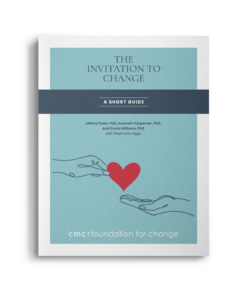People often come to our workshops excited to learn about how changing your actions can immediately start helping your loved one. But the beginning of our time together actually focuses on an entirely different concept: changing your understanding!
Starting with understanding can feel like a disappointing detour, keeping you from accessing more practical skills. You may feel that it’s beside the point, or that actions are most important while changes in thought can come later.
But creating long-term, sustainable change begins with this vitally important part of helping.
We center “Helping with Understanding” in our approach because shifting the way you think about your loved one’s substance use can actually shift the way you interact with every other part of the change process. When you understand where your loved one’s behavior is coming from, you can better understand how to help them.
What’s more, changing your understanding means gaining a better understanding of yourself: your reactions, feelings, and thoughts. This type of insight can help you stay true to your values throughout the process of supporting your loved one.
So What Does It Mean?
In order to effectively deal with any problem, you must first understand where it comes from, what contributes to it occurring, and how it is affecting both you and your loved one.
To illustrate this concept, we have developed the following video exercise. We invite you to watch it while thinking about the kinds of feelings that might come up if you were involved in the situation described.
Behaviors Make Sense
One of the things we hope you take from this video is that people’s behaviors make sense. Even when someone’s actions seem completely unreasonable (or even destructive), their behaviors are still motivated by a set of values that you can likely understand.
To put it in context: your loved one is not using substances because they’re “crazy” or because they want to “piss you off” (though it may feel that way sometimes!). People use substances because it provides something important to them, like relief from pain, the ability to sleep, or simply a feeling of calmness when they may have few other reliable sources of peace.
Even when the negative consequences of their use start to pile up, the fact remains that your loved one is likely getting something deeply positive from substances – and the presence of these negative consequences doesn’t make the positives go away. It simply means they both exist together.
Why does this matter? Because once you understand what the positives of use are for your loved one, you can help them to find alternatives. For example, if they smoke to take away boredom, you might offer to spend more time with them doing something you both enjoy. If they drink to unwind at the end of the day, maybe they might benefit from an engaging form of exercise instead. Try and brainstorm what some of these alternatives might be, by yourself or together.
Additionally, understanding their motivations can help you better frame your own feelings of frustration, fear, or sadness. While these reactions are natural ones to have, they likely stem more from your worry about the unpredictability of your loved one’s behaviors than the reality of their motivation.
To return to the person running into traffic – before you knew their motivations, their actions were scary and upsetting in part because the person seemed unaware of the danger they were in. After you learned their motivations, you could better contextualize the situation: why they were in the road, why the danger was worth it for them, and how you might be able to help.
Realizing that their behaviors make sense can allow for the hope that you will be able to move towards change together.




